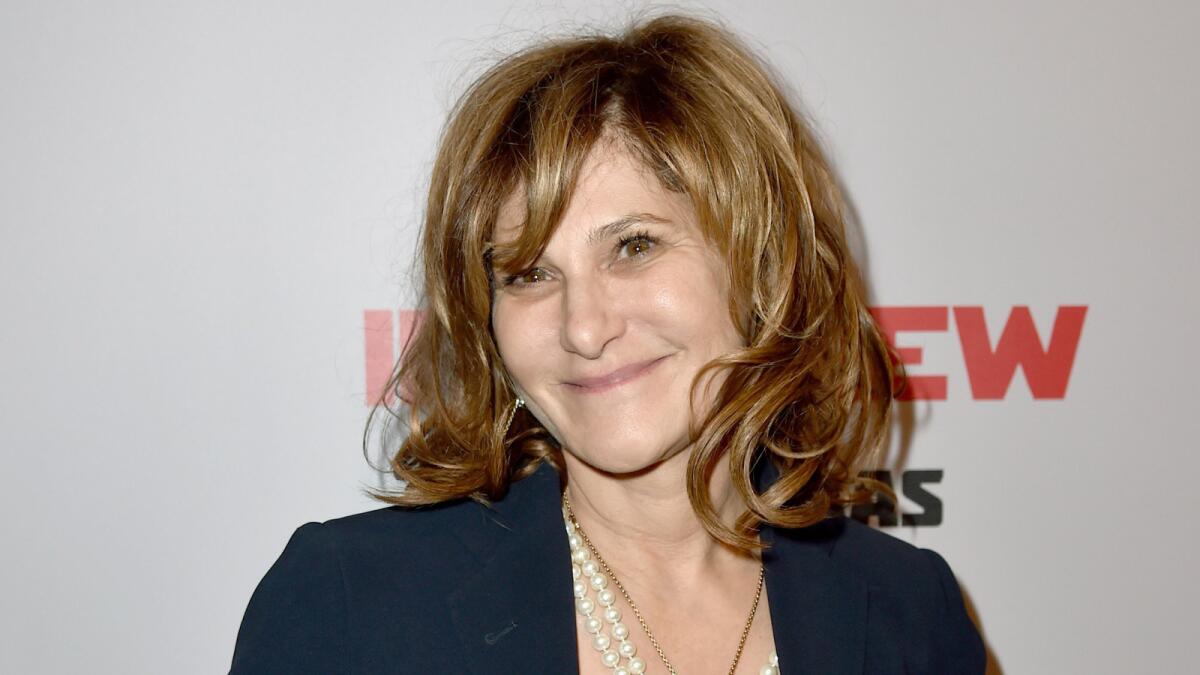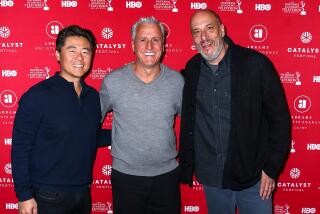Sony shake-up possible after hack, analysts say

Top management at Sony Pictures Entertainment are feeling the walls close in on them.
Continued fallout over the Nov. 24 cyberattack that released derogatory missives not meant for public consumption, combined with the decision to cancel the Christmas release of “The Interview,” have analysts wondering how long Chairman Michael Lynton and co-Chairman Amy Pascal can survive.
Many think that a shake-up is likely and that Pascal, Lynton or someone higher up in Tokyo parent Sony Corp. could take the fall for a barrage of embarrassing publicity. U.S. authorities believe that North Korea was behind the hack, upset that “The Interview” is centered on a fictional assassination plot of ruler Kim Jong Un.
The studio’s leadership has come under scrutiny on several fronts.
Questions have been raised about why the studio greenlighted “The Interview,” despite concerns expressed by senior executives within Sony Corp. about the sensitive nature of the subject matter and how North Korea might react.
Current and former employees have filed class-action lawsuits, saying the company didn’t do enough to prevent hackers from penetrating the studio’s network and accessing personal records, including Social Security numbers, addresses and salaries.
And on Wednesday executives were forced to pull the plug on the movie after the nation’s top theater owners refused to screen it on Christmas, dealing a further blow to the Culver City studio. The decision is expected to force Sony to take a write-down of about $80 million.
The daily barrage of bad news has tarnished Sony’s image and put more pressure on its leaders.
“Something needs to happen,” said Dave Logan, an expert in management and organization at the USC Marshall School of Business. “The damage here is so great, it’s hard to see how the leadership recovers. What would happen in most boardrooms at this point is that it might be easier to move forward with new leadership.”
Laura Martin, a media analyst with Needham & Co., said the expected write-down from canceling “The Interview” wouldn’t cause much concern among investors and analysts. But she agreed that someone at Sony would probably be forced out.
Martin believes that canceling the release of the film means the studio is admitting that it made the wrong decision to go forward. It is “more likely that a more senior person than Amy Pascal loses their job,” she said, “because they are now succumbing to pressure that they obviously underestimated six months ago.”
But there are some who aren’t sure that a shake-up will happen.
Some celebrities and executives in Hollywood have rallied around Sony management, whose emails were stolen from their inboxes and sent out for public consumption. Sony could keep Lynton and Pascal in their jobs, recognizing that they were victims of a cyberattack that could have hit any studio.
Pascal was hired in 1996 and as of January her contract was due to expire in 2015.
“I think in this case it would be overdone to fire the people involved because anybody could have made these decisions and faced the kind of backlash they are receiving,” said Gene Del Vecchio, adjunct professor at the USC Marshall School of Business who specializes in entertainment and marketing.
The company declined to comment.
Added pressure came Thursday in New York as the Rev. Al Sharpton, a civil rights activist and founder of the National Action Network, stepped up his demands that Pascal make amends for her racially insensitive comments about President Obama, which appeared in leaked emails with producer Scott Rudin.
Sharpton and National Urban League President Marc Morial met for 90 minutes with Pascal at the Greenwich Hotel, the luxury hotel owned by Robert De Niro in the Tribeca neighborhood in downtown Manhattan.
Sharpton did not call for Pascal’s resignation, but said “the jury’s still out” on what action his organization will take against the beleaguered studio executive going forward.
The civil rights leader said Sony has agreed to assemble a “working group” that will collaborate with the National Action Network, the National Urban League, the NAACP and the Black Women’s Roundtable on ways to address racial bias and the lack of diversity in Hollywood.
“We are not going to be satisfied until we see something concrete done,” said Sharpton, who declared that the emails — which suggested that Obama’s taste in movies would be inclined toward titles with black subject matters and casts — reflected an “almost all-white hierarchy” in Hollywood’s power structure. Both Pascal and Rudin have publicly apologized for the emails.
Morial was somewhat more conciliatory after the gathering. “I thought we had a candid and productive conversation with Amy,” he said. “As far as moving forward, our interest is in changing Hollywood. Our interest is that Sony is on the right side of changing Hollywood.”
Even if the meeting with Sharpton and Morial can quell the reaction over the Obama-related emails, Pascal still faces a major repair job on her strong standing in Hollywood’s creative community.
In a November email to Sony Pictures Entertainment Motion Picture Group President Doug Belgrad, Pascal complained about a handful of projects being developed by the studio, and some of the filmmakers involved in them. The messages have rankled some actors, including Kevin Hart and Zoe Saldana, who have vented about the emails on social media.
“Hollywood, like any industry, functions on trust and likability,” Logan said. “Those are very strong comments that work against trust and likability.”
Battaglio reported from New York and Verrier from Los Angeles.
More to Read
From the Oscars to the Emmys.
Get the Envelope newsletter for exclusive awards season coverage, behind-the-scenes stories from the Envelope podcast and columnist Glenn Whipp’s must-read analysis.
You may occasionally receive promotional content from the Los Angeles Times.








